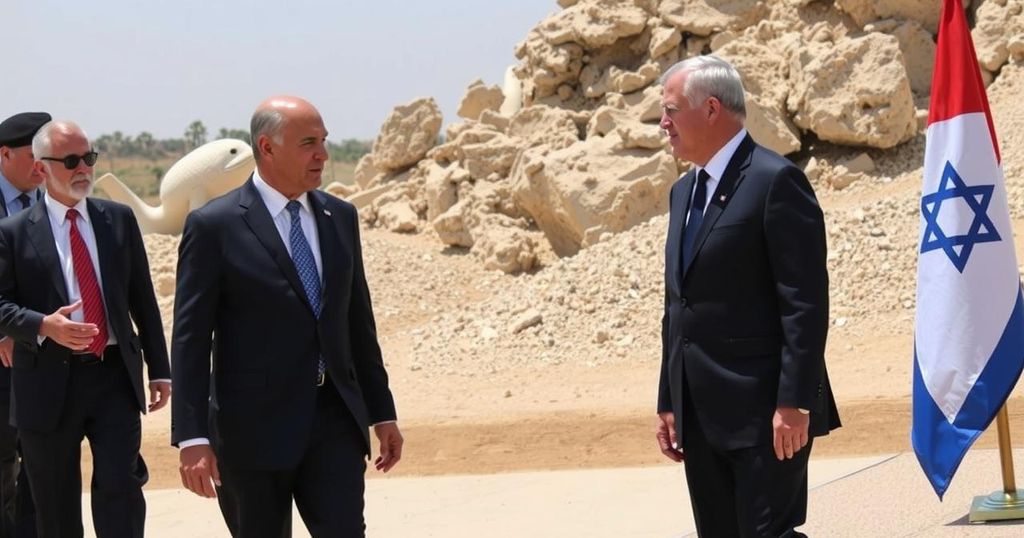U.S. Efforts to Mediate Conflicts in Gaza and Lebanon During Blinken’s Visit

U.S. Secretary of State Antony Blinken is visiting Israel to discuss revitalizing cease-fire negotiations in Gaza and increasing humanitarian access while addressing tensions with Hezbollah. This visit highlights ongoing U.S. efforts to mediate complex regional conflicts, amidst significant humanitarian concerns due to the conflict’s casualties.
U.S. Secretary of State Antony Blinken is scheduled to meet with Israeli leaders on Tuesday with the primary goal of reviving stalled cease-fire discussions in Gaza, increasing humanitarian access, and easing tensions with Hezbollah in Lebanon. This marks Blinken’s 11th visit to the region since the outbreak of conflict in Gaza in October 2023. The agenda includes discussions with Israeli Prime Minister Benjamin Netanyahu and Defense Minister Yoav Gallant. Previous negotiations mediated by the United States, Egypt, and Qatar have been unsuccessful in halting the violence in Gaza or facilitating the release of hostages taken by Hamas. A senior official from the State Department indicated the challenges in recommencing negotiations, especially following last week’s killing of Hamas leader Yahya Sinwar by Israel. Blinken is anticipated to travel to Jordan afterward and will raise the urgent humanitarian crisis in northern Gaza with Israeli counterparts and Arab leaders. Furthermore, U.S. representatives have developed preliminary plans for Gaza’s governance post-conflict, which they are ready to discuss with Israeli officials. Nimrod Goren, a senior fellow specializing in Israeli affairs at the Middle East Institute, expressed skepticism about achieving any substantial diplomatic breakthroughs during Blinken’s visit, citing significant disparities between Israeli and Hamas demands regarding cease-fire conditions. The State Department has recently emphasized the dire humanitarian situation within Gaza. Deputy spokesperson Vedant Patel remarked, “Certainly, nobody in the U.S. government is going to stand in front of you and say that we are satisfied or find the humanitarian situation in any part of Gaza satisfactory.” He indicated that the United States would continue urging for improved access to humanitarian aid, noting existing open border crossings that facilitate aid into Gaza. Meanwhile, U.S. envoy Amos Hochstein conducted discussions in Beirut, seeking to address the ongoing conflict along the Israel-Lebanon border. Hochstein described his meeting with Lebanese Parliament Speaker Nabih Berri as “constructive” and outlined the need for fostering a new trajectory of security and prosperity for Lebanon. He referenced U.N. Security Council Resolution 1701, established post-2006 conflict, as a basis for future discussions. Despite the lack of implementation of this resolution, Hochstein emphasized that achieving confidence between the involved parties is essential. Israel aims to prevent Hezbollah from threatening its northern borders to ensure the safe return of its citizens. The recent escalation began after Hezbollah engaged in aerial assaults following the October 7 attacks by Hamas, which resulted in significant Israeli casualties and captivities. In response, Israel’s military offensive in Gaza has led to severe Palestinian casualties, with the Gaza Health Ministry reporting over 42,600 deaths, without distinguishing between combatants and non-combatants. The international community, including the United States, United Kingdom, and European Union, has labeled both Hezbollah and Hamas as terrorist organizations. This situation remains precarious, as the need for a sustained dialogue, effective humanitarian aid delivery, and a long-term resolution to the conflicts in Gaza and Lebanon is critical.
The United States has a significant role in mediating conflicts in the Middle East, particularly between Israel and Palestinian groups, as well as with Hezbollah in Lebanon. Following a surge in violence in the region, U.S. Secretary of State Antony Blinken’s visit aims to reinvigorate discussions surrounding cease-fire agreements and humanitarian access. This ongoing conflict has resulted in severe humanitarian crises, prompting international calls for action. The geopolitical dynamics in the region are complex, involving various state and non-state actors with often conflicting goals.
Secretary Antony Blinken’s forthcoming visit to Israel seeks to address the escalating crises in Gaza and Lebanon through diplomatic means, aiming to resume cease-fire negotiations and facilitate humanitarian efforts. The challenges presented by the stark contrasting positions of the involved parties, particularly between Israel and Hamas, complicate these efforts. Nevertheless, continuous engagement by the U.S. and multilateral discussions with Arab partners may pave the way for future resolutions and stability in the region.
Original Source: www.voanews.com








